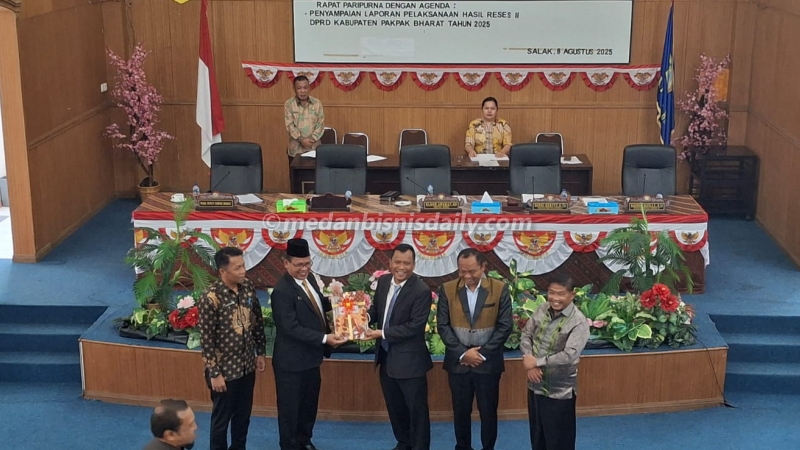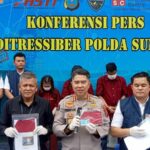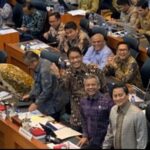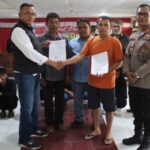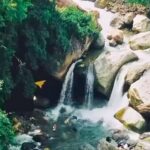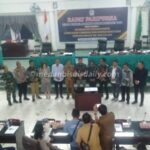The Regional People’s Representative Council (DPRD) of Pakpak Bharat Regency held a plenary meeting to present the report on the implementation of Recess II for 2025.
The plenary session, led by Deputy Chairman Sonni Berutu, was attended by DPRD Chairman Elson Angkat, Regional Secretary Jalan Berutu, heads of regional offices, sub-district heads, and other invitees.
After the session was opened, the floor was given to spokespersons from each of the three Recess II teams to present their findings.
Team A spokesperson Marta Rizki Oktavia Berutu outlined several community proposals from Electoral District I, covering Sitellu Tali Urang Julu, Pergetteng-getteng Sengkut, and Salak sub-districts.
From Sitellu Tali Urang Julu, proposals included road paving continuation to Ulumerah Village, electricity network installation in Cikaok Village, and road rehabilitation in Silimakuta Village.
Other requests included a tractor for Cikaok Village, cocoa seedlings for Silima Kuta Village, and road maintenance in Salak sub-district.
Residents also urged the government to establish inter-village boundaries in Salak and construct retaining walls along Boangmanalu’s ring road.
From Pergetteng-getteng Sengkut, proposals included road improvements, bridge rehabilitation, streetlight maintenance, and water pipeline extensions to multiple villages.
Team B spokesperson Mawardi Tumanggor presented findings from Sitellu Tali Urang Jehe and Pagindar sub-districts, including requests for streetlights in Perolihen Village.
Residents sought community halls due to limited home space and clarification about protected forest signage causing unrest. Other needs included school fencing, water channel repairs, and road widening in accident-prone areas.
Pagindar sub-district proposals included landslide area repairs, heavy equipment placement for natural disasters, and agricultural support for durian and oil palm farmers.
Team C spokesperson Selloh Cibro reported on Kerajaan, Tinada, and Siempat Rube sub-districts, highlighting needs like district hall construction, soccer field development, and clean water facilities.
Road improvements were requested to tourist sites and farm areas, along with electricity network installations and sports field rehabilitation in Tinada.
Siempat Rube residents urgently sought road repairs, retaining walls, and bridge construction to expand farmland access.
The session concluded with the formal handover of the Recess II Report to the Regional Secretary and a group photo.
Pakpak Bharat Regency DPRD
The Pakpak Bharat Regency DPRD (Regional People’s Representative Council) is the local legislative body of Pakpak Bharat Regency, a region in North Sumatra, Indonesia, known for its indigenous Pakpak Batak culture. Established as part of Indonesia’s decentralization reforms, the DPRD plays a key role in local governance, representing the interests of the Pakpak community while addressing regional development. The regency itself was formed in 2003, splitting from Dairi Regency to better administer the area’s cultural and administrative needs.
Sitellu Tali Urang Julu
Sitellu Tali Urang Julu is a traditional village located in the Pakpak Bharat Regency of North Sumatra, Indonesia. It is known for its rich cultural heritage, particularly of the Pakpak people, and features traditional houses, rituals, and communal practices that have been preserved for generations. The village offers insights into the indigenous way of life and the historical traditions of the Batak Pakpak community.
Pergetteng-getteng Sengkut
“Pergetteng-getteng Sengkut” is a traditional cultural site or ceremony associated with the Karo Batak people of North Sumatra, Indonesia. It is often linked to rituals or communal gatherings that celebrate harvests, ancestral traditions, or social unity. While specific historical details may vary, the practice reflects the Karo Batak’s deep connection to their agrarian roots and spiritual heritage.
Salak
Salak is a mountain located in West Java, Indonesia, known for its historical and spiritual significance. It is home to the *Kawah Ratu* (Queen Crater) and has been a site for geothermal research as well as local legends and pilgrimages. The mountain’s name, which means “salt” in Sundanese, is tied to folklore about a mystical queen believed to have once ruled the area.
Sitellu Tali Urang Jehe
Sitellu Tali Urang Jehe is a traditional village located in the Pakpak Bharat Regency of North Sumatra, Indonesia. It is known for its rich cultural heritage, particularly of the Pakpak people, featuring traditional houses (*jabu*) and customary rituals. The village preserves ancient traditions and serves as a cultural site where visitors can learn about the local way of life and history of the Pakpak community.
Pagindar
“Pagindar” refers to a historical and cultural site in the Pamir Mountains, often associated with the Wakhan Corridor in Afghanistan. It holds significance as a traditional meeting point for local communities and travelers along ancient trade routes, including the Silk Road. The area reflects the rich cultural heritage of the Pamiri people and their historical connections to Central Asian trade and migration.
Kerajaan
“Kerajaan” refers to the historical kingdoms or sultanates that once ruled various regions in Southeast Asia, particularly in present-day Indonesia and Malaysia. These kingdoms, such as Majapahit, Srivijaya, and Malacca, were influential in trade, culture, and politics from around the 7th to the 16th centuries. Many Kerajaan sites today are preserved as cultural heritage landmarks, showcasing ancient architecture, traditions, and the region’s rich history.
Tinada
“Tinada” likely refers to **Las Tinadas**, a traditional cultural site in Spain known for its historic stone huts or shelters used by shepherds and farmers. These structures, often found in rural areas like the Sierra de Gredos, date back centuries and reflect the region’s pastoral heritage. Today, they serve as a reminder of rural life and are sometimes preserved as cultural landmarks.
If you meant a different “Tinada,” please provide more context for a precise summary!

